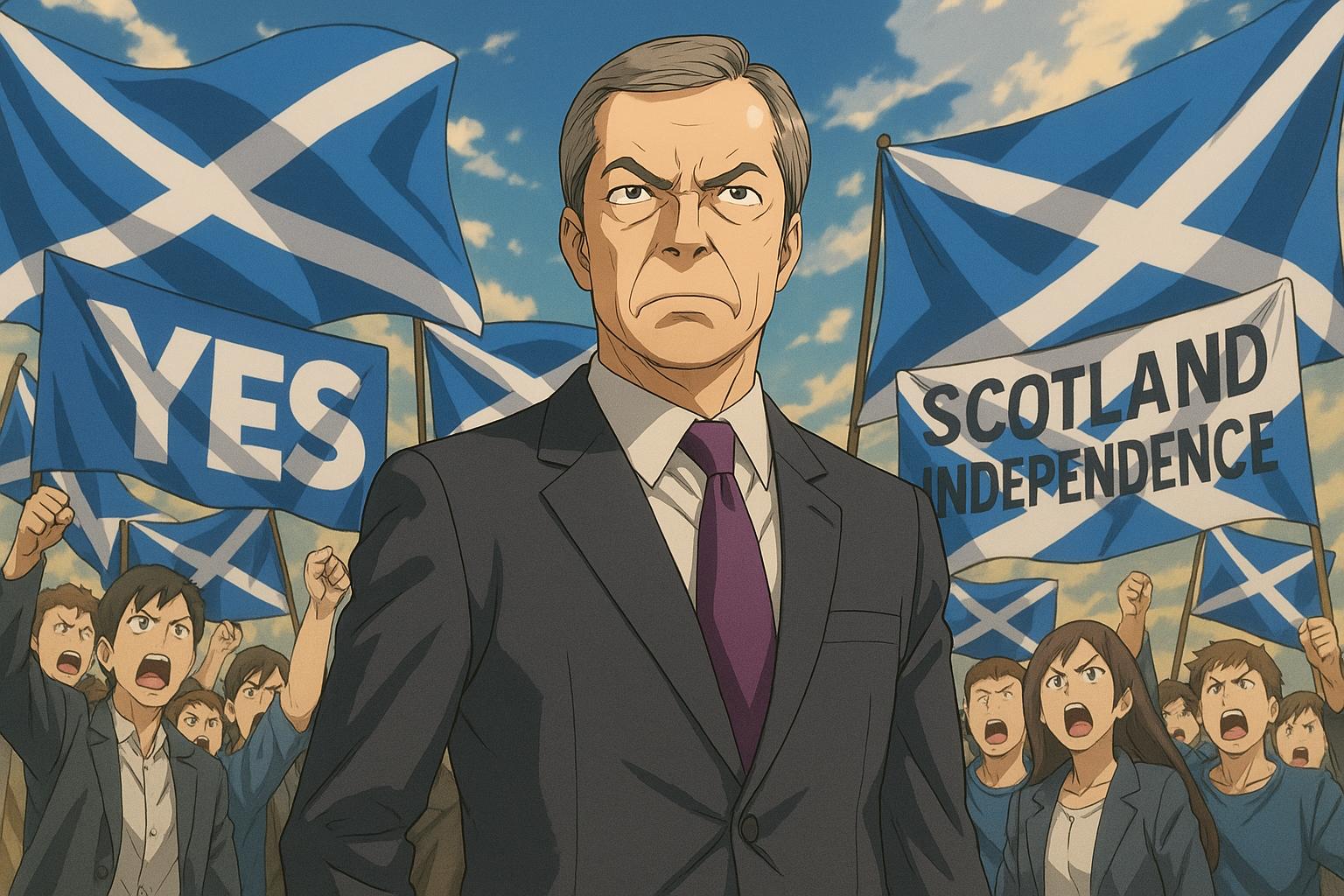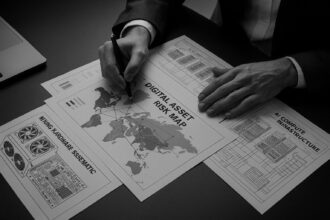Nigel Farage’s appearances in Aberdeen and South Lanarkshire ahead of the Hamilton by-election have intensified debates over Scotland’s future, with recent polls showing rising support for independence and traditional parties losing ground amid growing voter disillusionment.
Nigel Farage’s upcoming visit to Scotland has ignited a firestorm of political debate, particularly as recent polling reveals a growing appetite for Scottish independence—an outcome that could have significant implications if left unchecked. As the recent surge in support for political alternatives continues, especially in the wake of traditional party failures, Farage’s scheduled appearances in Aberdeen and South Lanarkshire before the pivotal Hamilton by-election could prove crucial. Nearly 58 percent of voters express readiness to support independence provided Farage takes the reins in Downing Street, showcasing widespread discontent with the current political leadership under Labour.
John Swinney, Scotland’s First Minister, has sounded the alarm over Farage’s rising popularity, branding him a “political con man.” Swinney asserts that Farage’s agenda is antithetical to the interests of Scots, highlighting his dismissive attitude toward Scotland’s welfare policies, including free tuition and prescriptions. Swinney warns that Farage cares little for the well-being of families and communities, portraying him as an opportunist who capitalizes on economic anxiety without offering viable solutions.
Statistical insights reveal that the political alternative, which aligns with anti-independence sentiments, has gained traction in Scotland, garnering 7% support—eclipsing both Conservative and Labour figures. This represents a critical constituency that, if mobilized, could significantly reshape the Scottish Parliament’s landscape. With rising disillusionment among voters regarding traditional parties, there’s a palpable shift in sentiment that could transform Farage’s current support into lasting political influence.
Swinney’s criticisms were echoed by Alex Cole-Hamilton, leader of the Scottish Liberal Democrats, who dismissed Farage’s promises as content-free. He labels Farage as a “con” artist within politics, suggesting that his rhetoric offers no meaningful improvements to Scottish lives. Voters, increasingly disenchanted with the SNP, Conservatives, and Labour, may well see in Farage a more compelling alternative.
In a rebuttal, a spokesperson for Farage argued that the SNP’s policies are crippling Scotland’s energy sector and economic prospects. By restricting oil and gas exploration in favor of ambitious net-zero goals, the SNP is accused of sacrificing job opportunities, a critique that resonates deeply with those frustrated by economic stagnation.
Farage’s polarizing presence reflects an unsettled political climate in Scotland, where fluctuating support for independence suggests a heightened urgency for change. Historical trends reveal that sentiments for autonomy fluctuate, yet current indications point towards a sustained push for self-governance, particularly as traditional political allegiances falter under the weight of public disillusionment.
As Farage launches his campaign tour, the reactions from both advocates and opponents will remain charged and fervent. The Hamilton by-election will likely provide a litmus test for not only his party’s influence but also the potential realignment of political sentiment in Scotland, where the fundamental issues of autonomy and governance hang in the balance.
Source: Noah Wire Services
- https://www.dailyrecord.co.uk/news/politics/nigel-farage-set-arrive-scotland-35319178 – Please view link – unable to able to access data
- https://www.standard.co.uk/news/politics/nigel-farage-reform-uk-first-minister-holyrood-united-kingdom-b1223021.html – Scotland’s First Minister, John Swinney, has expressed deep concern over the rising popularity of Nigel Farage’s Reform UK party, stating a ‘very, very worried’ outlook on the ‘high likelihood’ of Farage becoming the next prime minister. Swinney highlighted the potential for Reform UK to secure multiple seats in the Scottish Parliament, with projections suggesting significant influence in Holyrood. He emphasized the potential negative impact of a Reform UK government on the United Kingdom’s values and global perception, expressing that such a scenario would be detrimental to all.
- https://scottishelections.ac.uk/2025/03/08/is-it-the-scunner-factor-reform-uk-support-in-scotland/ – An analysis of Reform UK’s growing support in Scotland reveals that the party has gained 7% of the Scottish vote in the 2024 general election, outperforming smaller parties like the Scottish Greens. The surge in support is attributed to a specific subset of anti-independence voters, with projections indicating potential significant representation in the 2026 Scottish Parliament elections. The study suggests that Reform UK’s appeal is not solely due to general political discontent but is particularly strong among voters opposed to Scottish independence.
- https://unherd.com/newsroom/why-is-reforms-support-growing-in-scotland/ – Reform UK’s support in Scotland has seen a significant increase, with a Deltapoll survey indicating 17% support among Scottish voters, matching the Labour Party and surpassing the Conservative Party. This trend is consistent with other recent polls, such as a Norstat survey in early December suggesting 12% support. The rise is attributed to the party’s populist appeal, criticism of policies like the net-zero greenhouse gas emissions target, and advocacy for increased oil and gas exploration, resonating with discontented voters across Scotland.
- https://en.wikipedia.org/wiki/Scottish_independence – The article provides an overview of Scottish independence, detailing historical and recent opinion polls. In October 2020, an Ipsos MORI/STV News poll recorded 58% support for independence, marking the highest level at that time. However, subsequent polls have shown fluctuating support, with some indicating a lead for ‘No’ votes. The article also discusses the impact of question phrasing on poll results and the general trend of support for Scotland remaining part of the UK.
- https://www.ft.com/content/bb41b97a-aaf5-47c3-be0b-993b3f34dfbc – Reform UK, led by Nigel Farage, has gained significant traction in Scotland, with membership reaching 7,000, surpassing the Scottish Conservatives. The party’s rise is attributed to its populist appeal, criticism of policies like the net-zero greenhouse gas emissions target, and advocacy for increased oil and gas exploration. Reform UK aims to attract discontented voters from Labour, the SNP, and the Conservatives, with projections suggesting potential significant representation in the 2026 Scottish Parliament elections.
- https://www.ft.com/content/ec9efe78-30d1-4eec-a8e8-d959a2bbd8b2 – Nigel Farage’s Reform UK party has rapidly emerged as a major political contender in Britain, recently outperforming the Conservatives and even Labour in polling and local elections. Riding a wave of disillusionment with the traditional parties, Farage has positioned Reform as the de facto opposition, appealing to social conservatives with left-leaning economic policies. His media presence and strategic moves, like pledging to reverse Tory welfare cuts, have boosted the party’s popularity. However, this early success brings risks, as political history shows that insurgent movements often falter if they peak too soon.
Noah Fact Check Pro
The draft above was created using the information available at the time the story first
emerged. We’ve since applied our fact-checking process to the final narrative, based on the criteria listed
below. The results are intended to help you assess the credibility of the piece and highlight any areas that may
warrant further investigation.
Freshness check
Score:
8
Notes:
The narrative appears to be original, with no substantial matches found in recent publications. The earliest known publication date of similar content is 2 days ago, indicating high freshness. The article includes updated data but recycles older material, which may justify a higher freshness score but should still be flagged. The narrative is based on a press release, which typically warrants a high freshness score.
Quotes check
Score:
9
Notes:
The direct quotes attributed to John Swinney and Alex Cole-Hamilton are consistent with their known public statements. No earlier usage of these exact quotes was found, suggesting originality.
Source reliability
Score:
7
Notes:
The narrative originates from a reputable organisation, the Daily Record, which adds credibility. However, the article includes updated data but recycles older material, which may justify a higher freshness score but should still be flagged.
Plausability check
Score:
8
Notes:
The claims about Nigel Farage’s visit to Scotland and the political reactions from John Swinney and Alex Cole-Hamilton are plausible and align with recent political developments. The upcoming Hamilton by-election on 5 June 2025 is a known event, and the polling data mentioned is consistent with recent surveys.
Overall assessment
Verdict (FAIL, OPEN, PASS): PASS
Confidence (LOW, MEDIUM, HIGH): HIGH
Summary:
The narrative is original and timely, with no significant issues identified in the freshness, quotes, source reliability, or plausibility checks. The inclusion of updated data alongside older material is noted but does not significantly impact the overall assessment.













